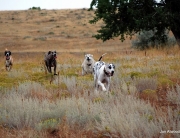There are many different kinds of dog training techniques out there. They can all be successful in creating a dog that knows commands and follows cues. But how a dog learns these training cues and commands is the key in the dog’s ability to retain the knowledge long term, as well as the willingness to respond to their owner. Depending on the training technique used, the dog will either respond to their owner based on earning a reward or based on avoiding a punishment. Which would you as a human prefer? I’m personally highly reward motivated.
We as humans love to hear the word “yes” and “you’re doing this right” rather than “no” and “you’re doing this wrong”. This is why I as a positive dog trainer use positive techniques when training dogs. They love to hear that they’re doing things the right way. They love getting attention, food, toys, or even playing their favorite game as a reward. Using positive methods sets up the human-dog bond to be based on mutual respect and trust. Dogs and people alike will respect and look up to those who show them positive reinforcement, and naturally will be weary of those who punish them. Think of how you feel when you get yelled at by your boss at work, rather than getting a raise or a bonus on your paycheck. Which will motivate you to work faster, harder, and more efficiently?
There’s a very common and widespread training technique called “Balanced Training” which means there’s an equal use of positive punishment and positive reinforcement. While this seems like a great concept because you get to tell the dog “you don’t dare do that or else, but do this instead”, you’re actually making things harder for yourself and the dog. For example, when leash training a dog with balanced techniques you’d yank or jerk on the leash and then reinforce the dog when back in the proper position. Not only does the jerk of the leash have the potential to scare the dog, but you also will lose some respect and trust of your canine friend. The positive punishment is an unnecessary step.
I get asked a lot “Well, why don’t you use punishment for dogs that deserve it?” and my response to that is, “I actually do use punishment, it’s just in the form of losing privileges or resources.” Losing the opportunity to earn a reward, losing the privilege of getting my attention, missing out on having freedoms of life are the kinds of punishments I use. It’s called negative punishment, which in itself sounds terrible or almost like double punishment. But in fact the “negative” part just means that you’re removing a good thing like treats, toys, space or attention. Remember back when you were a kid and you broke the rules which ended up with you being grounded? You lost your TV time, or weren’t allowed to play with your friends, or like in my case I wasn’t allowed to pet the animals (man….that one hurt!). Same concept is applied to dogs. Typically when you or your dog loses a privilege or resource the fallout of being physically or mentally harmed doesn’t come along with it. And neither does the loss of respect from your dog. Sure it kinda sucks but that’s where positive reinforcement comes in.
So when training your dog, or picking out a dog trainer, ask yourself what would motivate you more: earning a reward or avoiding a punishment? What would you choose for yourself?




















Are you able to certify a dog as a therapy dog? I r with autistic children on a daily basis almost as a nanny and I need my dog to be able to help combat some of the behaviors and calm them down before the event occur or after they have.